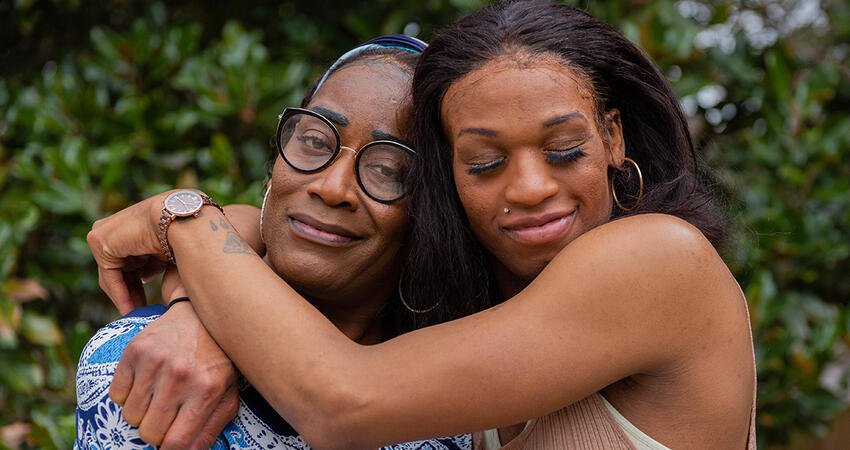
‘A Place That’s Safe’: Housing for Trans People, by Trans People
Following the smell of breakfast into the kitchen, 5-year-old Trophi* was surprised to see a tall woman with pretty hair at the stove instead of her granny. Hearing footsteps, the woman nearly dropped the hot pan she was holding and exclaimed, “My baby!”
That morning, Trophi met her mom for the first time.
Although her mom’s return sticks out as a warm memory from Trophi’s childhood, other positives are few and far between. Before her mom returned from prison, Trophi was sexually assaulted by her great-uncle. Upon her mom’s release, she moved Trophi and her siblings to Atlanta for a fresh start away from the memory of that trauma. At first, they stayed in hotels because it was all they could afford. The family eventually received a housing assistance voucher, but they quickly lost it when Trophi’s older brother was caught in a drug bust.
“This homeless and moving situation has been going on my whole life,” Trophi said. “I’m traumatized completely by homelessness, by neglect, by sexual harassment and sexual abuse, mental abuse—I’ve been through the storm.”
Now 31 years old, Trophi lives in Muffin’s Place, a house just south of Atlanta owned by the Trans Housing Coalition (THC). A relatively new organization, THC works to place Black and Latina transgender women in transitional and permanent housing and partners with other service providers around Atlanta to help secure stable futures for trans women.

Trophi and her dog Princess outside of Muffin's Place, a transitional house owned by the Trans Housing Coalition.
Nationwide, trans people—particularly Black trans women like Trophi—experience disproportionate rates of housing instability, a trend rooted in society’s vilification of trans people. Trans youth are more likely to become homeless because of familial and community rejection, which can often extend into adulthood as a result of employment discrimination. Black trans people experience this discrimination most acutely (PDF), with an unemployment rate of 20 percent (four times that of the general population) and a poverty rate of 38 percent (three times that of the general population).
As a result, trans people experiencing homelessness often need more than just a roof over their heads. They need tailored spaces and services where they can receive different kinds of support without fear of retraumatization or harassment—spaces where beginning to process and heal from extreme trauma becomes possible. But the nation’s current housing system rarely meets these specific needs.
“None of our systems are built with trans people in mind,” said Gabi Velasco, a policy analyst in the Urban Institute’s Research to Action Lab. “When there’s so much instability and so little security, it’s just hard to trust that you’re going to a place that’s safe.”
Amid a national environment that is increasingly hostile to trans people’s very existence, THC and other similar organizations are pursuing new and innovative strategies to address gaps in the housing system to ensure that trans people experiencing homelessness have their needs met and can find safe, supportive, and stable housing situations.
Discrimination makes trans people more likely to experience homelessness
Compared with the general population, transgender people are more likely to experience homelessness and have fewer resources to turn to when they do. Trans people are more likely to be discriminated against when trying to rent a permanent home; even after finding permanent housing, they are significantly more likely to lose that stability. Evidence shows 1 in 5 trans people are evicted because of discriminatory responses to their gender identities and expressions. Given that they are more likely than the general population to experience workplace discrimination, trans people also typically have less of a financial safety net to fall back on in the event of an eviction.
A 2015 survey from the National Center for Transgender Equality estimated that 30 percent of transgender people have experienced homelessness at least once in their lives. And the 2020 US Department of Housing and Urban Development (HUD) point-in-time count (PDF) found that the number of trans people experiencing homelessness increased by 88 percent between 2016 and 2019.

Atlanta housing prices skyrocketed during the pandemic, with the median rent now around $1,400 for a one-bedroom. With trans people disproportionately facing barriers to employment, those prices can sometimes seem insurmountable.
For many trans people, experiences with homelessness begin at an early age, just as they did for Trophi. Many trans youth experience familial and community rejection, which can push them into homelessness. With much of the existing housing system designed for adults, barriers to accessing support systems are much higher for young people, leading to a cycle of homelessness.
For both trans youth and adults, the shelter system poses its own challenges. Finding shelter can be difficult, as many shelters enforce policies aligned with the gender binary, meaning they restrict access to just men or women or divide sleeping spaces by gender. One study found that almost 30 percent of trans people were denied shelter because of their gender identity.
Shelters are often segregated by sex and tend to rely on ID gender markers or physical characteristics associated with a person’s sex assigned at birth instead of their gender identity. Additionally, some homelessness services and supports are gender specific, such as trans-exclusionary women’s-only shelters, which may be difficult for trans people to access. As a result, trans people experiencing homelessness are more likely to be unsheltered, with a 2020 study finding that more than half (56 percent) of trans people reported finding shelter would be very difficult or impossible because of their identity.
Even if trans people experiencing homelessness do find a shelter that respects their gender identity, it may not always be safe. Congregate housing can lead to violence and harassment, with 44 percent of trans and nonbinary people reporting that they were mistreated at a shelter. Ultimately, the existing shelter system often puts trans and nonbinary people at risk of violence and makes it harder for them to access much-needed health and employment services.
Historically, the federal government has ignored the rampant discrimination that trans people, especially Black and Latinx trans people, experience when seeking housing and other supports. Only in 2020 did the Supreme Court include sexual orientation and gender identity as protected classes, leading HUD to issue a memo that it would investigate all claims of discrimination by LGBTQ individuals.
In the decades preceding the codification of these formal protections, trans men and women and nonbinary individuals sought to create their own trans-specific spaces to overcome the discrimination they faced in housing. In 1970, Sylvia Rivera and Marsha Johnson, a Latina trans woman and a Black drag queen, co-founded Street Transvestite Action Revolutionaries (STAR), one of the first trans-specific organizations in the United States, to help get trans people off the street. Rivera and Johnson felt that the gay rights movement had largely ignored transgender people and the specific barriers they faced. That November, they purchased STAR House—a four-bedroom apartment where they would help any trans-identifying people experiencing homelessness.

A 2019 point-in-time count found that roughly 50 trans and gender nonconforming people were experiencing homelessness in the Atlanta area, with the majority of them unsheltered.
Despite its short existence, STAR House has remained a spiritual successor to many trans housing organizations since. At the end of her life, Rivera lived in Transy House, which had a mission akin to that of STAR House and lasted for more than a decade in the late 1990s. Currently, House of Tulip in New Orleans, Princess Janae Place in New York City, and other organizations across the country are helping transgender people experiencing homelessness find housing.
“For a lot of queer and trans people, their primary social support is the people around them,” Velasco said. “So creating housing systems that are designed by people who share these identities and are in the community enables programs and structures to be built that have the nuance needed to address the specific axes of trans and gender nonconforming housing insecurity.”
How the Trans Housing Coalition helps trans women find stability
The Trans Housing Coalition (THC) in Atlanta also has its roots in this long history. Originally a GoFundMe created by trans photographer Jesse Pratt Lopez to help some women she knew, THC became a formal organization in the summer of 2020. During the protests in the wake of George Floyd’s murder, Lopez’s GoFundMe received more than $3 million in donations, which Lopez began to put toward creating a sustainable organization that could support Black and Latina trans women in Atlanta in the long term.
With guidance from local trans-led organizations as well as Someone Cares, an organization focused on health and well-being for people living with HIV, Lopez officially started THC to put the money to use helping Black and Latina trans women move into permanent housing.
Three years later, Lopez passed director duties to Mary Wilson, who now manages a team of four case managers. According to Wilson, the organization’s mission these days is simple: help in whatever way possible.
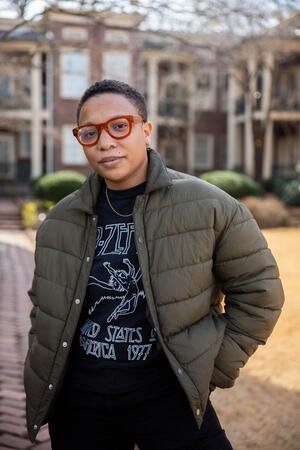
Mary Wilson, the director of the Trans Housing Coalition, hopes to provide whatever support the women she works with need, no matter how big the ask.
In addition to putting women up in hotels and Airbnbs, THC purchased Muffin’s Place, a six-bedroom house about seven miles south of Atlanta. As THC became more formalized, it instituted a housing-first approach, meaning that it doesn’t require people to meet certain criteria to receive assistance and prioritizes finding permanent housing for the women while also offering wraparound services to address their other needs. The organization connects women with partner organizations across the city, helping them acquire housing vouchers, legally change their names, apply for trans-friendly employment, and receive necessary medical care, among other services.
Since its inception in the summer of 2020, THC has helped around 300 trans women get off the street and into housing, Wilson said. And she has plans to expand the services THC offers to ensure the women don’t fall back into homelessness.
In 2022, THC received a grant from United Way to provide direct cash assistance to some of the women it serves. In the first year, United Way gave five women $250 each month in exchange for filling out a survey. Through those surveys, THC and United Way learned that the extra money had helped the women buy groceries, pay utilities, and avoid survival sex work. This year, United Way doubled the grant, providing the same stipends to 10 women.
“Just an extra 250 bucks a month could change their life,” Wilson said. “So that’s what we’re working toward this year. We’re completely focusing on keeping the money going, because some nonprofits don’t make it.”
In their own words
To better understand the barriers trans women face within the housing system, we asked some of the women who have worked with THC to describe their experiences living as a transgender woman in Georgia in their own words.
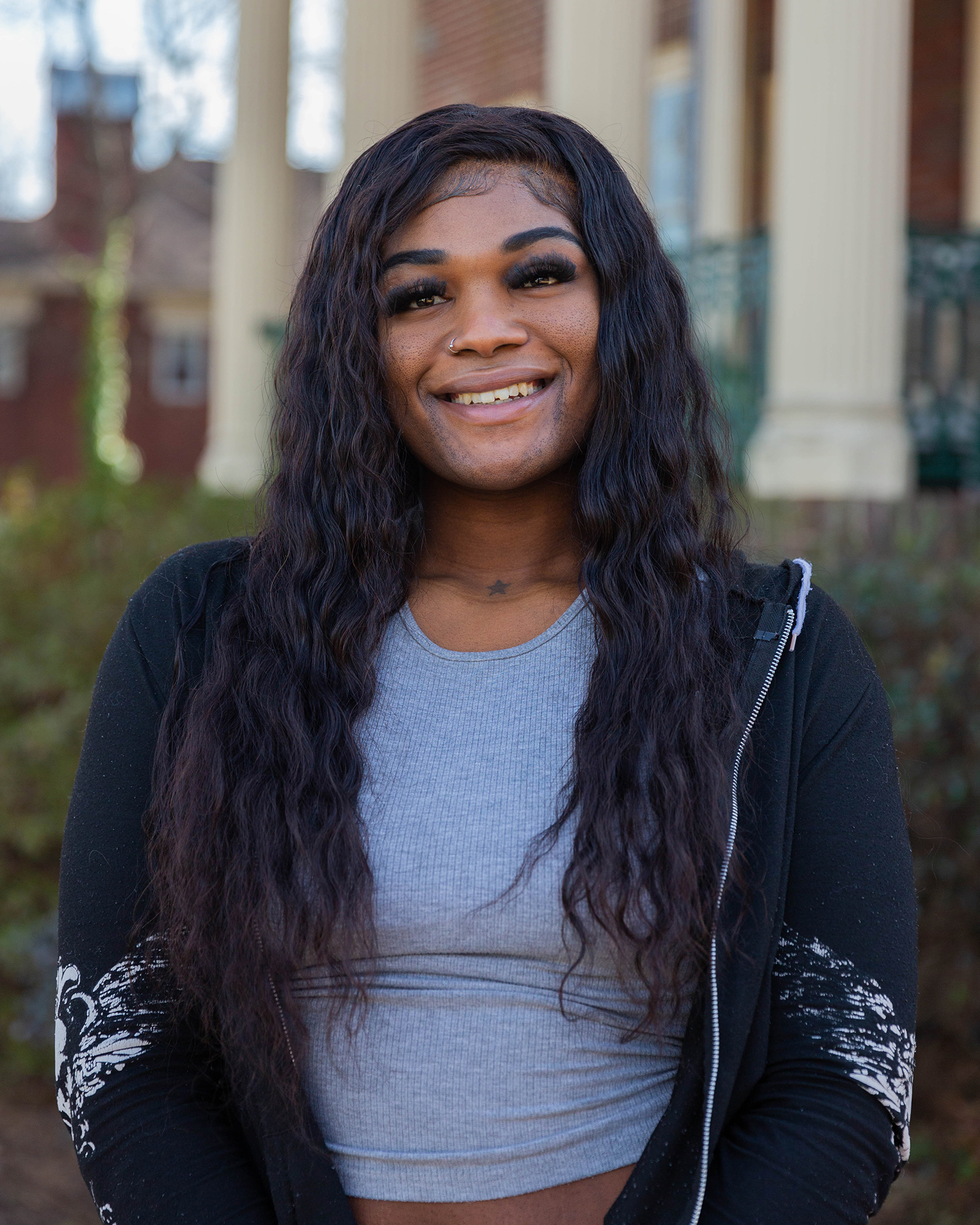
“Being trans is kind of different because you're different—it's like you stand out the pack. Before I got to hormones, I was just androgynous, just dressing up like a girl. And it's just society, what society does to people like that, going through that. And family just didn't understand it as well. They still don't, and that's why even though I have family here, it doesn't matter. I don't really talk to my family. I went five years without speaking to my mother, my sister, nobody. Honestly, I was born trans. I just knew I was always a girl, so that's just what fuels me mostly. This is what I'm supposed to be doing. They either going accept it or not, and I'm still going to do what I want to do.”
—Jaime
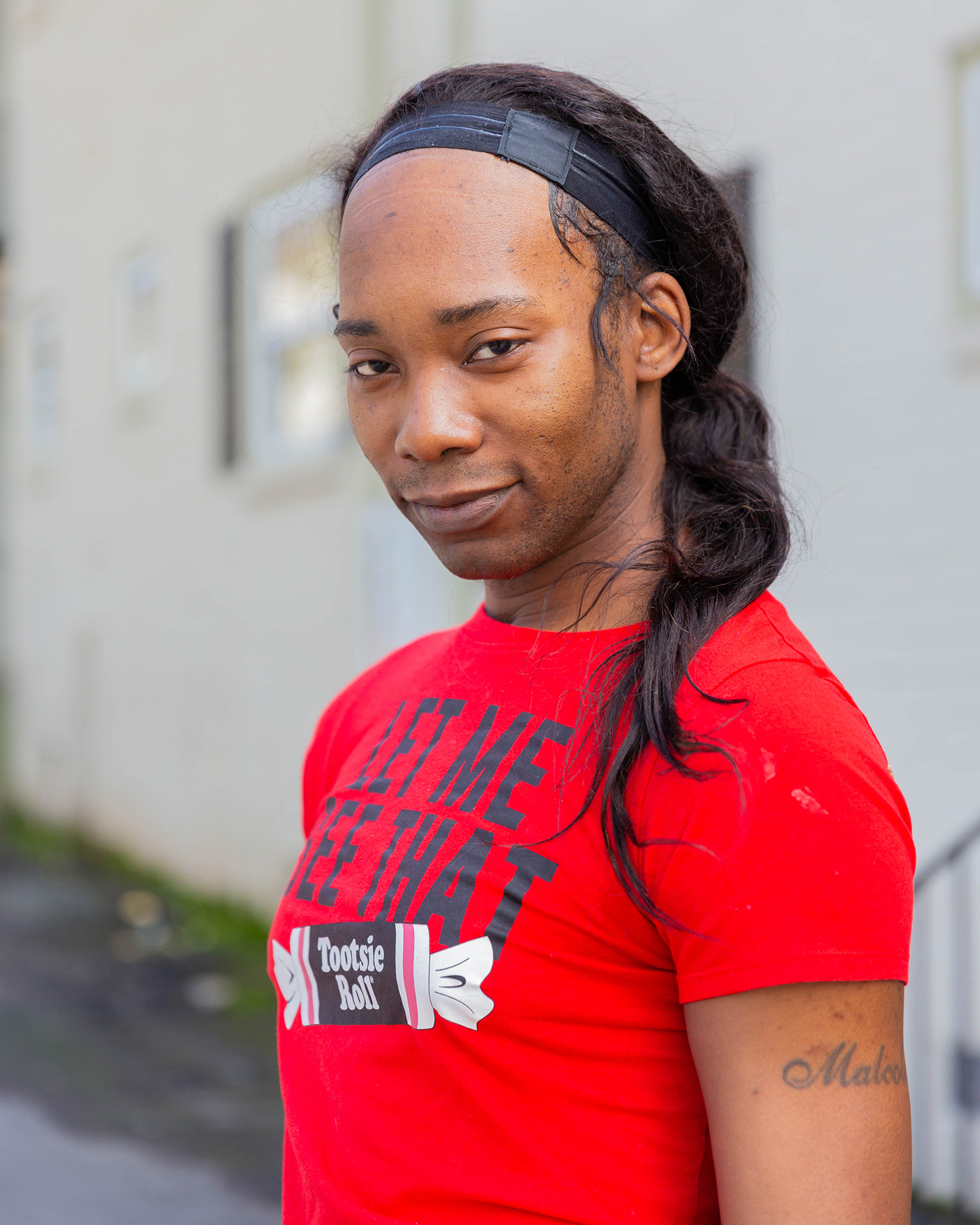
“I'm family oriented. I still talk to my mom and dad, I still talk to my sisters and brothers, but I wanted different. I wanted my own life, and I was tired of hiding, living in their life. They didn't know I was transitioning while I was in prison. I started transitioning because I've been a woman all my life. I dress up as a woman. After high school, I've been a woman ever since. In prison, I said I might as well make the change, so I started transitioning.”
—Queen
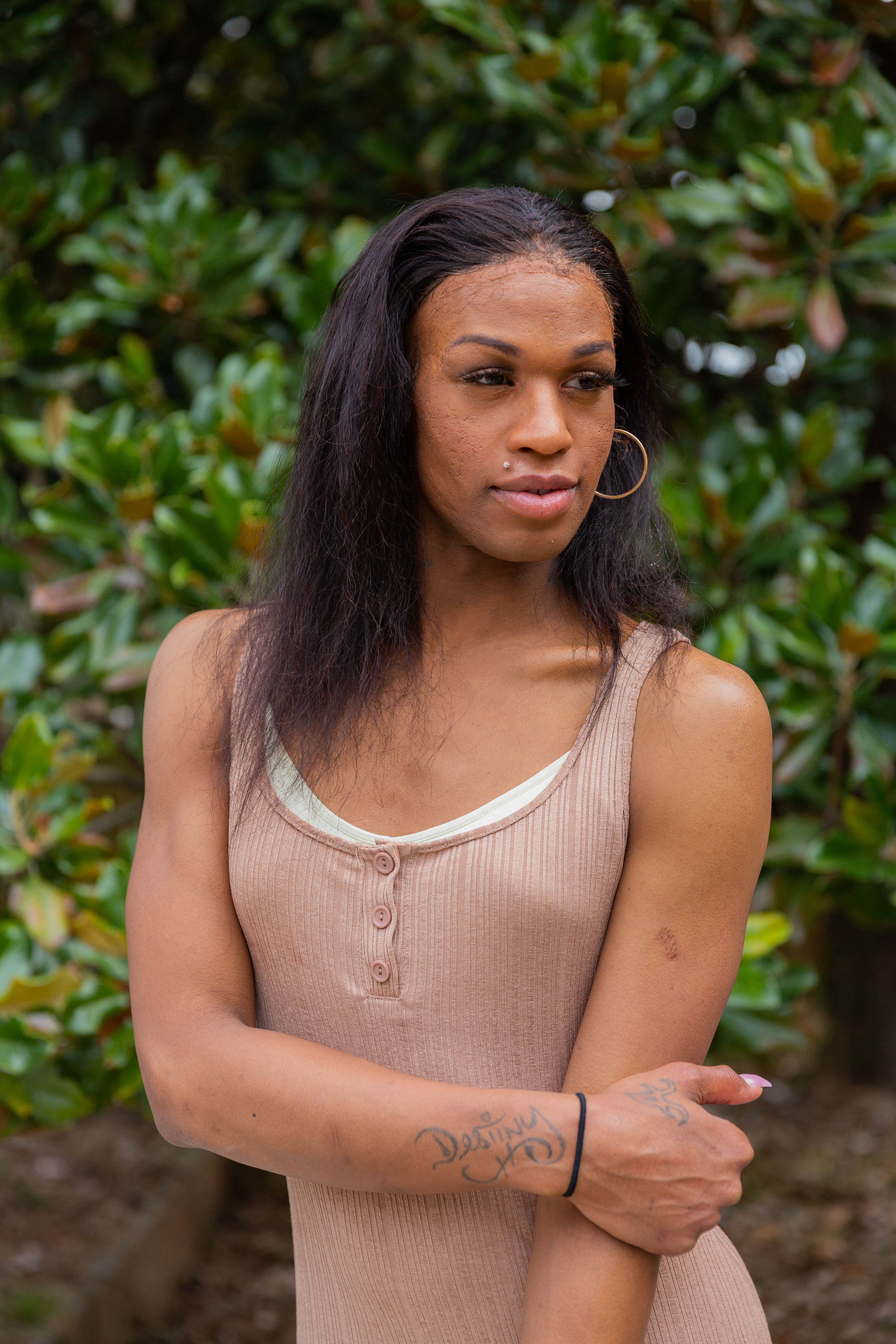
“You know, the people who look down on us so much, they don't know how strong we really are. We came from the bottom of the food chain and we're still fighting. We have been through so much—all we want is to be healthy and loved. That's it. It's like people have tendencies where they'll like treat you wrong and treat you bad, because that's what they think you're used to anyway and that's the only thing that you'll understand. But it's not true. Today, I've changed my life completely around, and at this point I don't care what anyone has to say about me. I'm going to push and I'm going to go for what I want, and if you don't like it, you can kick rocks.”
—Trophi
Relying on community support and connection to meet specific needs
THC and other trans-led organizations fill gaps in the housing system by offering environments where transgender people can more comfortably connect with social services. Many of the women THC helps have been cut off from family, experienced employment discrimination, or spent time in prison—experiences that the traditional housing system may not acknowledge as barriers, and even if they do, may not understand or support. These women have all come to THC in need of someone who understands their experiences and is willing to help.
“What I’ve found is that girls are a little more able to connect with the social services when there was someone who looked like them, walked like them, and talked like them,” said Jayme Steger, a case worker with THC and a transgender woman. “I think with us being women of trans experience, we just feel like we’re loved, we’re comforted, we’re so many other things with someone who looks like us.”
At her lowest, Steger stood in a daze in the middle of Ponce de Leon Avenue, with cars whizzing past. A doctor at a nearby clinic ran into the street and pulled her to safety. Steger remembers telling the doctor after, “I want to do better and everything, but it's just hard.”
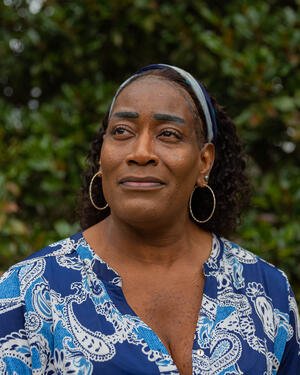
Jayme Steger, a case worker for the Trans Housing Coalition and a Black trans woman, found a community of support among other trans women and wants to provide something similar at THC.
Steger didn’t turn everything around immediately, but she did take a course at Georgia State University to become a peer specialist during her recovery. After earning her certificate, she got a job at Someone Cares. Now, years later, Steger still works with trans women, ensuring that they get the same care and understanding that the doctor gave her.
Historically, transgender people have had to look out for each other, living by the adage, “We keep each other safe.” Chosen family structures and strong community supports are vital but are not enough to combat the extent of institutional disinvestment in housing nationwide. Exchanging informal housing knowledge, staying with friends, and establishing housing partnerships can help fill some gaps, but without external social supports, isolated intracommunity support can create additional burdens.
“You often have people who themselves are financially insecure in some way and are navigating systems of oppression supporting people who are in a worse spot than them at the moment,” Velasco said. “This perpetuates financial instability and is a reason why more formal housing partnerships can be advantageous.”
By operating as informal mutual aid groups, trans communities can meet each other’s needs without drawing extra prejudice. More formal avenues for help, including organizations like THC, can ease the undue burdens put on the community—but this in turn requires more visibility and working within systems that are not generally hospitable to trans people. While formalization such as 501(c)(3) status brings in more resources, Velasco said, it can also force trans-led organizations to work within funding structures that may not allow for the full suite of services trans individuals need.
“They’re trying to operate outside of the systems that haven’t worked, but you have a reality where the systems that exist have the power and the resources,” Velasco said. “It’s going to be really important to look at that question of navigating visibility and safety if these organizations are able to sustain themselves and exist.”
Supporting trans people within a hostile policy landscape
Across the country, trans people’s rights are under attack. In Florida, proposed legislation would prevent teachers from using a student’s chosen pronouns. In Tennessee, a recent bill banned gender-affirming care for any trans people under 18, effective this July. And in Mississippi, a proposed bill would define sex as unchangeable (PDF) from what is assigned at birth. All told, more than 400 bills across 44 states have been put forward to limit the rights and threaten the lives of transgender people.
As laws change and trans people’s newly granted legal rights are stripped away, trans-specific organizations like THC will become increasingly important. But more research is needed to understand how these organizations navigate existing systems and changing restrictions. For policymakers and practitioners to best support trans people, it’s critical to work with these organizations—both formal and informal—to learn from their expertise, understand how they operate, and collaborate to build capacity, navigate funding barriers, and target additional support.
According to Wilson, one of the biggest challenges for THC is the lack of expanded Medicaid access in Georgia. In Virginia, where Wilson used to work, someone experiencing homelessness could go to a hospital, explain their situation, and receive same-day health care. In Georgia, that kind of coverage doesn’t exist, leaving people experiencing homelessness with few avenues to receive needed medical care. And in March of this year, Georgia lawmakers passed a bill that restricts doctors from offering gender-affirming care to trans youth.
Funding is also a constant barrier for trans-led organizations. The original GoFundMe has provided a strong foundation for THC, and Wilson estimates that without additional fundraising, THC could stay open for another two and a half years. But her primary objective is to ensure the organization lasts much longer, while continuing to expand its services. For now, THC plans to keep housing women, keep referring them to services, and keep expanding.
“The girls give us hell sometimes,” Wilson said. “But they need it, and it’s so great to see them come through the other end.”
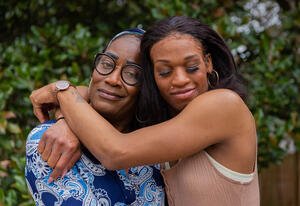
Trophi and Steger hug outside of Muffin's Place.
Right now, in the Muffin’s Place driveway, Steger gently but firmly advises the man in the cherry-red Mercedes not to get Trophi into any kind of trouble. While Steger works to place her in more permanent housing, Trophi has been interviewing and auditioning as a model around Atlanta. Today, the man is giving her a ride.
Although some of the girls think of Steger as a maternal figure, she tends to buck that characterization. She knows trans women can face a long path to a stable life, and she just wants each of the women THC helps to get there.
For Trophi, the first step is building daily habits and keeping herself productive. The second is finding a job.
* Some of the people we interviewed requested that we not use their full names, so we applied that practice to each of the people in this story.
This feature was funded by the Urban Institute's Housing Matters initiative. The views expressed are those of the authors and should not be attributed to the Urban Institute, its trustees, or its funders. Funders do not determine research findings or the insights and recommendations of our experts. More information on our funding principles is available here. Read our terms of service here. Learn more about Housing Matters’ funding principles here.